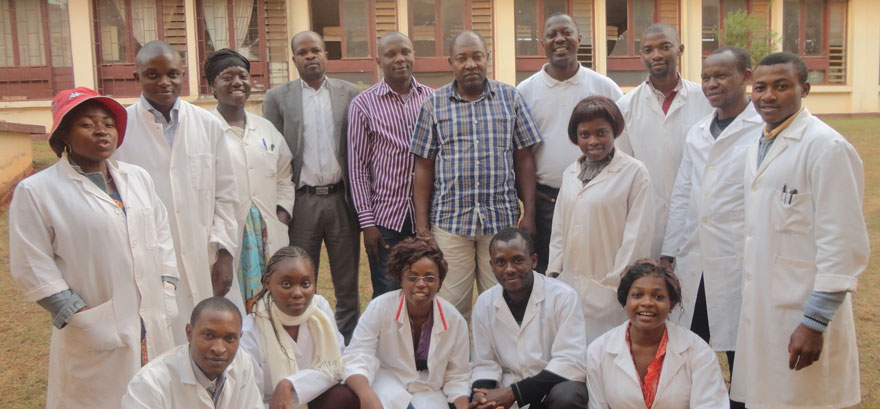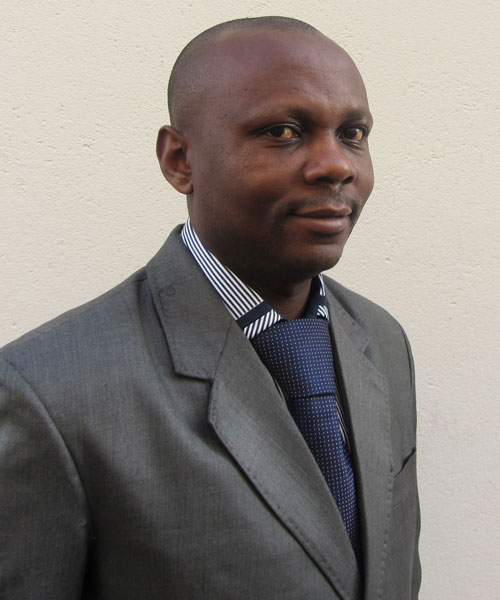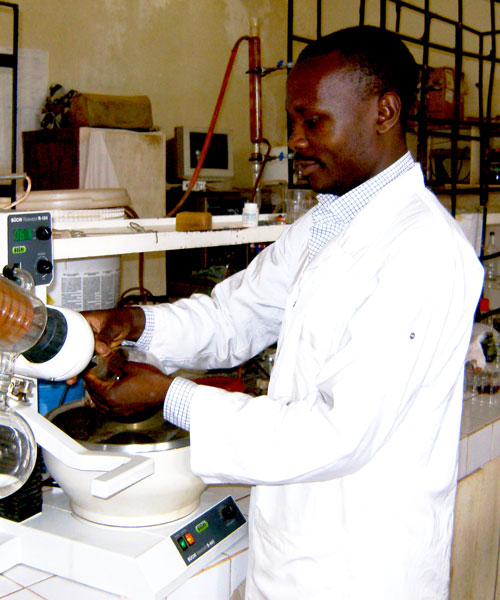
Rémy Bertrand Teponno, a chemist from Cameroon, has won the 2017 TWAS-Atta-ur-Rahman Prize for his discovery of new plant compounds with potential antibacterial properties that could be useful in medical applications.
Teponno received the prize for his research on Cameroonian plants and microorganisms, which produce active chemical components that can be used in therapeutic settings to treat common diseases. Some of these substances might also help to tackle the common and severe problem of antibiotic resistance that affects infectious diseases treatment worldwide.
"I am really grateful and honoured to receive this prestigious TWAS prize," said Teponno, a senior lecturer-researcher in the department of chemistry at the University of Dschang (UDS) in Cameroon. "It is very important for a scientist like me to know that people are appreciating his work. This prize will enable me to be more productive, and it will be a source of motivation for my future career."
The prize is given in the name of Atta-ur-Rahman, a Pakistani chemist and a 1985 TWAS Fellow. The award is bestowed annually to acknowledge the scientific achievements of a chemist under the age of 40 who has been living and working in one of the 66 scientifically and technologically lagging countries that TWAS has identified. It is worth USD5,000, generously offered by the Dawood Foundation.
Teponno is a skilled organic chemist with extensive experience in the extraction and characterization of chemicals from plants. As a student at UDS, he obtained his bachelor's degree in 2001 and his postgraduate diploma in organic chemistry in 2003. After receiving his master's degree in 2005 at the University of Yaoundé 1 in Cameroon, he returned to UDS to complete a PhD in organic chemistry/natural products chemistry.
Studying plant extracts is a matter of personal interest and passion to Teponno. Cameroon's biodiversity is astonishing: about 8,000 different plants grow there, and many have therapeutic properties well-known to local people who exploit them following family and orally transmitted traditions.
"More than 80% of the Cameroonian population uses medicinal plants to cure diseases, using their power according to traditional medicine," explained Teponno. But since that knowledge is often informal, it needs to be distilled through scientific knowledge and rigorous approaches.
During his PhD research under the co-supervision of Professor Tapondjou Azefack Léon and Professor Tane Pierre, Teponno worked on a plant used in traditional medicine to cure microbial infections and typhoid fever, called Dioscorea bulbifera. From Dioscorea, he isolated some compounds and tested them against microorganisms causing typhoid fever (Salmonella typhi and Salmonella paratiphi). The isolated compounds showed an important antimicrobial activity.
In 2010 Teponno's career received a boost: he was awarded a TWAS research grant that led to an important result: allowing isolation, structure elucidation of specific chemicals, and evaluation of antimicrobial properties of many Cameroonian medicinal plants of the Agavaceae family.
Two years later he was selected for a cooperation visit, offered by TWAS and the German Research Foundation (DFG), which gives postdoctoral researchers from sub-Saharan Africa a three-month posting to work with scientists at a German institute.
"During my stay there, I established important scientific collaborations," Teponno said, "and even today we are sending our samples there for chemical and spectroscopic analysis."
To further build his analytical skills in organic chemistry, Teponno has worked as a fellow and visiting scientist at several institutions, including Helmholtz Centre for Infection Research, Braunschweig, the Johannes Gutenberg Universty of Mainz and Dortmund University of Technology in Germany; the Protechnik Laboratories in Pretoria, South Africa; the University of Camerino in Italy; and the Graduate School of Pharmaceutical Sciences, Kyushu University in Japan. There, he learned powerful new techniques that he is introducing in Cameroon.
Back home, he started exploring an area new for Cameroon: seeking a direct correlation between the use of local plants in traditional medicine and their chemical composition and their chemical action on bacteria. Discovering antimicrobial and cytotoxic activities in several natural compounds has disclosed a whole new world to him and his country.
"Cameroonian plants are full of new compounds that have never been analyzed before," Teponno explained. "These chemicals could reveal promising therapeutic agents, and they could also break bacterial resistance."
When bacteria are exposed over time to common antibiotics – often after doctors over-prescribe the drugs – they evolve to develop resistance. The drugs become ineffective, leading to a proliferation of antibiotic-resistant bacteria that can contaminate the environment and put patients at risk.
With new natural products, Teponno says, it is not easy for bacteria to adapt immediately. This would give doctors a better chance to cure microbial infections. However, Teponno added: "Today my research is not only focused on medicinal plants but also on plant-associated microorganisms, which live in plants and develop a mutually beneficial relationship with them." A group of these microorganisms called endophytes are hosted by plants' tissues. There, they produce chemical compounds that protect the plants. As a reward, plants nourish them.
"Now I'm able to isolate bacteria from plants, to culture them, and to extract and separate the substances they generate. As a final step, I solve their chemical structure through spectroscopic analysis. I'm learning many modern techniques now."
Facilities in Cameroon are scarce. In general, Teponno observed, it is difficult to do research in developing countries. This is why he keeps developing collaborations with Japan, Germany and Italy. But working and living in Cameroon is important: in the Laboratory of Environmental and Applied Chemistry of the UDS where he is carrying out his research, Teponno is supervising four PhD students. Teaching is a central part of his work.
"I was greatly inspired by many books that Professor Atta-ur-Rahman has written," he acknowledged. "Now I'm teaching my students, and I'm transferring to them – and also to colleagues – these technologies and Professor Rahman's teachings."
"This honour from TWAS is a source of motivation: I will use the money to buy some lab consumables for my students, because now I have several young scientists whom I'm supervising. Their careers depend on me."
Cristina Serra
About the Atta-ur-Rahman Prize
The Atta-ur-Rahman Prize was established in 2012 by TWAS Fellow Atta-ur-Rahman of Pakistan, a leading scientist and scholar in the field of organic chemistry, renowned for his research in areas related to natural product chemistry. The award brings a prize of USD 5,000, and is annually given to a talented chemist under the age of 40 who lives and works in any of the 66 developing countries where capacity in science and technology is significantly lagging. This year the prize is generously offered by the Dawood Foundation. Winners are invited to attend the TWAS General Meeting and give a public lecture on their work. Each TWAS Regional Office is asked to present one candidate from their region, and the final selection is made by professor Atta-ur-Raman himself.
Previous winners are: Bijay Singh, Nepal (2016); Mirabbos Hojamberdiev, Uzbekistan (2015); Mohamed Fawzy Ramadan Hassanien, Egypt (2014); Mohammad Abdul Hasnat, Bangladesh (2013); and Shamsun Nahar Khan, Bangladesh (2012).
About TWAS
The World Academy of Sciences for the advancement of science in developing countries – TWAS – works to advance sustainable prosperity through research, education, policy and diplomacy. TWAS was founded in 1983 by a distinguished group of scientists from the developing world, under the leadership of Abdus Salam, the Pakistani physicist and Nobel Prize winner. Today, TWAS has more than 1,200 elected Fellows from 96 countries; 15 of them are Nobel laureates. The Academy is based in Trieste, Italy, on the campus of the Abdus Salam International Centre for Theoretical Physics (ICTP). Through more than three decades, its mission has focused on supporting and promoting excellence in scientific research in the developing world and applying scientific and engineering research to address global challenges. TWAS receives core funding from the government of Italy and essential programmatic funding from the Swedish International Development Cooperation Agency (Sida). The United Nations Educational, Scientific and Cultural Organization (UNESCO) administers TWAS funds and personnel.
To learn more, visit www.twas.org. And follow TWAS on Facebook or Twitter (@TWASnews).

